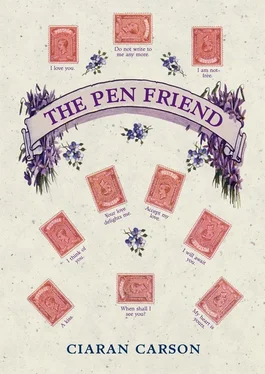He would finish by giving an account of the first Esperanto Congress, held in Boulogne on Saturday 5th August 1905, when the new Esperanto flag, a green rectangle with the green star in a white quarter in the upper left-hand corner, flew together with the French tricolour from the flagstaffs and windows of the Municipal Theatre. It was the first time Zamenhof had spoken in public; he did not even know if his words would be understood by the seven hundred or so delegates who came from many different countries, each perhaps with their own notions of how the language should be pronounced. He began nervously, but his confidence grew as he saw his audience respond with nods of comprehension and appreciation. This present day is sacred, he said. Our meeting is humble; the outside world knows little about it and the words spoken here will not be telegraphed to all the towns and villages of the world; Heads of State and Cabinet Ministers are not meeting here to change the political map of the world; this hall is not resplendent with luxurious clothes and impressive decorations; no cannons are firing salutes outside the modest building in which we are assembled; but through the air of our hall mysterious sounds are travelling, very low sounds, not perceptible by the ear, but audible to every sensitive soul; the sound of something great that is now being born. Mysterious phantoms are floating in the air; the eye does not see them, but the soul sees them; they are the images of a time to come, a new era. The phantoms will fly into the world, will be made flesh, and assume power, and our sons and grandchildren will see them, will feel them, and take great joy in them.
Zamenhof spoke on, realising that his audience, so willing to understand, was hanging on his every word; and when he ended by reciting a prayer he had composed for the occasion, a prayer not directed to the God of any national or sectarian religion, but to some mysterious Higher Power, a thunderstorm of acclamation broke out in the hall, and complete strangers embraced, and shed tears of joy. And my father would then conclude his introduction to Esperanto by telling how Ludwig Zamenhof, heartbroken by the events of the First World War, died on 14th April 1917. It was my father’s first birthday, and Zamenhof was fifty-seven, the age, Nina, that I am now.
It’s taken me some time to respond directly to your latest card, but I seem to have spent years in my mind since it arrived just yesterday. I note the stamp, the 65c Bluebell, a flower also known as wild hyacinth, behind which lies one of those Ancient Greek stories concerning the jealous cruelties of the gods, which so much resemble our own. It concerns the beautiful youth Hyacinthus, who was loved by both Apollo, the Sun-God, and Zephyrus, the God of the West Wind. But Hyacinthus preferred Apollo, and Zephyrus looked for revenge. So one day, when Apollo and Hyancinthus were throwing the discus, Zephyrus blew it out of its proper course, striking Apollo’s lover on the head and killing him instantly. Apollo, stricken with grief, raised from his blood a purple flower, on which the letters, Ai, Ai , were traced, so that his cry of woe might live forever on the earth. But since the bluebell that is native to these islands bears no such message, it was called Hyancinthus nonscriptus , not written on.
And your postcard is barely written on, just my name and address, and the initial of your name, that I last saw twenty years ago, the slanted ascender of your N beginning on a curlicue and rising to an apex with the downward sweep of the diagonal, then rising again to end as it began in a matching curlicue. It is an elegant N that makes me think of the N we saw emblazoned on the bridges, monuments and state buildings of Paris, N that stands for Napoleon, whose remains are enclosed, like the last of a series of Russian dolls, within six coffins locked within a massive tomb of porphyry. You remember, Nina, how we thought N might more happily stand for Jules Verne’s Nemo, the captain of the Nautilus , Nemo meaning Nobody, whose underwater realm knew no boundaries of nation, or language for that matter, for Nemo and his crew communicated among themselves in a kind of Esperanto.
Language takes many forms, as witnessed by your postcard, THE LANGUAGE OF STAMPS , a vintage curiosity, perhaps some eighty or ninety years old, which purports to show how the position of a stamp on an envelope or card can bear a coded message: upside down in the bottom left, DO WRITE SOON ; right way up in the top left, DO YOU LOVE ME ; slanted in the same corner, I SEND YOU A KISS ; right-hand side of the surname, FORGET ME NOT ; and so on. You’ve placed your Irish Bluebell in the top right-hand corner, which could mean either HAVE YOU FORGOTTEN ME , or nothing at all, since this nowadays is the conventional position for stamps, and we are not used to seeing any other. More meaningful to me is the fact that you were in Drogheda when you posted it the day before yesterday, some thirty miles nearer to me than you were. I know that you would have been thinking of my father, for you could not have forgotten my telling you that, when I was ten, he had taken me on a pilgrimage to Drogheda to see the head of the Blessed Oliver Plunkett. The Blessed Oliver Plunkett, my father had often told me, was the Archbishop of Armagh at a time of relentless persecution of Catholics. He had set up a college in Drogheda in 1670, which was razed to the ground a year later. In 1679 he was arrested on a trumped-up charge of fomenting rebellion; and in 1681 he was executed at Tyburn in London by hanging, disembowelling, quartering and beheading, the head and forearms being salvaged soon afterwards, hidden in two tin boxes, and thence transported to Ireland, while the rest of the body remained in England.
It was December, the anniversary of Plunkett’s beatification, and bitterly cold. It was early afternoon when we arrived, and already it was getting dark. It was a long way from the railway station; as we walked the grey streets I knew that we were in a foreign town. The clothes in the shop windows looked different, and the butchers displayed unfamiliar cuts of meat. A fine rain was beginning to fall when we got to the church, which was strangely empty. There was an odour of wax and decaying incense. My father and I were the only ones who knelt by the shrine in a side-chapel, where the head of the Blessed Oliver was displayed, blackened and unrecognisable as having belonged to a human being, seeming to float in the gloom that was lit only by a few guttering candles; and for weeks afterward the head occupied my dreams, hanging bodilessly in a dark space that was at once remote and claustrophobic, like that inside a confessional box.
You’d asked me about Confession, you were intrigued by the concept. You have to make what’s known as an examination of conscience, where you review the past week, and see what sins you might have committed, we used to go to weekly Confession back then, I said. What sort of sins? you said. Well, that I was disobedient to my parents, or that I stole something, or, when I was old enough to have them, that I had impure thoughts, thoughts about girls that is. And how old were you then? you said. Oh, you’d be surprised, Nina, you can have impure thoughts when you’re ten or eleven, maybe younger. And did you steal, Angel? Well, not much, I said, maybe I shoplifted a few sweets, that kind of thing, or I’d take a few coppers from my father’s pockets when he lay sleeping on the sofa after doing a night shift. What they call venial sins, that you don’t get sent to hell for, you only have to do time in purgatory, I said. But what if you didn’t commit any sins, what then? Oh, sometimes you made them up, I said, because if you said you hadn’t committed any sins since your last Confession, the priest would be reluctant to believe you, and he would say, Are you sure, my son? For instance, you wouldn’t have picked a fight with your brother or sister, or you wouldn’t have been tempted to steal an orange or an apple from a greengrocer’s display, when no one was looking, or maybe you’d be reading one of your mother’s magazines, and you’d see a picture of a woman, and you’d have impure thoughts about that woman, the priest would say, and you’d think about it? And you would say, Maybe I did, Father, because it was entirely possible that you would do such a thing, or think such a thing, and the priest would give a little sigh of satisfaction, and say, Ah, I thought so, my son, we’re none of us perfect, and then he’d absolve you from this imagined sin, I said. But that’s bizarre, Angel, you said, it’s like something out of Kafka. Oh, don’t knock it, Nina, I said, it was a good exercise in contemplation, good exercise for the memory, trying to remember what you might or might not have done in the course of that week, reliving those dubious encounters with oranges and apples and women’s magazines. And it did teach you to examine your conscience, to realise that everything you do, every decision you make, every thought, or every thought you imagined you’d had, or might be tempted to have in the future, is important, that it is judged by some absolute standard of morality. That anyone can be guilty of something, if one looks hard enough at oneself. It taught you to know yourself, I said.
Читать дальше












